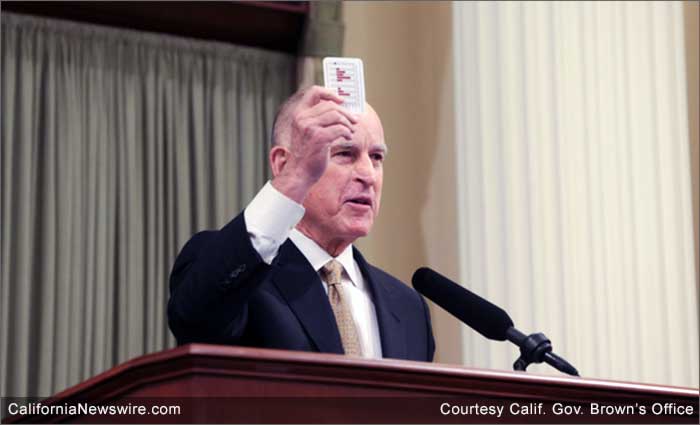SACRAMENTO, Calif. /California Newswire/ — Moving swiftly to maintain fiscal stability and prepare for the next economic downturn, Governor Edmund G. Brown Jr., Senate President pro Tem Darrell Steinberg, Assembly Speaker John A. Pérez, Senate Republican Leader Bob Huff and Assembly Republican Leader Connie Conway today announced a bipartisan agreement to replace the Rainy Day Fund on the November ballot with a dedicated reserve that allows the state to save for the future, while paying down its debts and unfunded liabilities.
“There’s nothing complicated about the idea of saving money and exercising fiscal restraint, but it’s not always easy to do,” said Governor Brown. “Democrats and Republicans have come together to create a Rainy Day Fund that ensures we’re not only saving for the next downturn, but also paying off our debt.”
“This agreement is faithful to what Assembly Democrats and I first proposed one year ago. This is a historic, bipartisan effort that builds a smart Rainy Day Fund and gets California’s budget spending off the boom and bust revenue rollercoaster. It is a strong example of what is possible when we all work together,” said Assembly Speaker John A. Pérez.
“This agreement strikes an appropriate balance between economic stability and economic growth. While we certainly don’t wish to return to the past, we cannot stagnate in the present either. Instead of stockpiling money while ignoring looming debt, this smarter approach locks the state into saving and attacks our wall of debt and unfunded liabilities. The result is a healthy, prudent ‘three-thirds’ balance that repays debt aggressively, leaves room for reinvestment in infrastructure and people, and protects vital services from further cuts in future economic downturns,” said Senate President pro Tem Darrell Steinberg.
“This Rainy Day Fund agreement reflects the type of bipartisan compromise that Californians should expect from their elected officials,” said Senate Republican Leader Bob Huff. “Republicans have long fought for this type of protection for Californians. The Governor set up a good framework for all of us to work from and we were determined to make sure this new reserve fund will be there during future economic downturns. It just makes sense to help avoid the tax increases and spending reductions that result from overspending in prosperous years. Good things happen when we can work together to benefit all Californians – I am confident the people will agree when they get to vote for it on the November ballot.”
“I am pleased that the Governor and our Democrat colleagues worked with Republicans to satisfy many of the concerns that we had with the Governor’s original proposal. This bipartisan compromise reflects many of our long-standing priorities for a Rainy Day Fund. It will ensure that money is actually saved, that it cannot be siphoned off to grow government, and that we will have resources to pay down debt and protect core priorities in tough years. After years of delay, today’s compromise will ensure that Californians will have a chance to vote on a long-overdue rainy day fund,” said Assembly Republican Leader Connie Conway.
Today’s agreement builds on the Governor’s proposal to bolster the state’s Rainy Day Fund, first introduced in January with his 2014-15 Budget. Last month, Governor Brown called a special session of the Legislature focused on the Rainy Day Fund and last week, the Governor testified in front of a legislative committee on his proposal.
The Rainy Day Fund agreement announced today will:
– Increase deposits when the state experiences spikes in capital gains revenues, the state’s most volatile tax revenue, and require annual deposits.
– Require supplemental payments to accelerate payoffs of the state’s debts and liabilities.
– Raise the maximum size of the Rainy Day Fund to 10 percent of General Fund revenues.
– Allow transfers to be suspended and withdrawals to be made from the Rainy Day Fund when needed during recessions within prescribed limits.
– Create a Proposition 98 reserve to smooth school spending and avoid future cuts. This reserve for schools makes no changes to the guaranteed level of funding dedicated to schools under Proposition 98. In addition, the Proposition 98 reserve would not begin until school funding is fully restored following cuts made during the Great Recession.
Votes on the new agreement are expected in the Legislature next week. The proposal will then go before voters on the November ballot.








